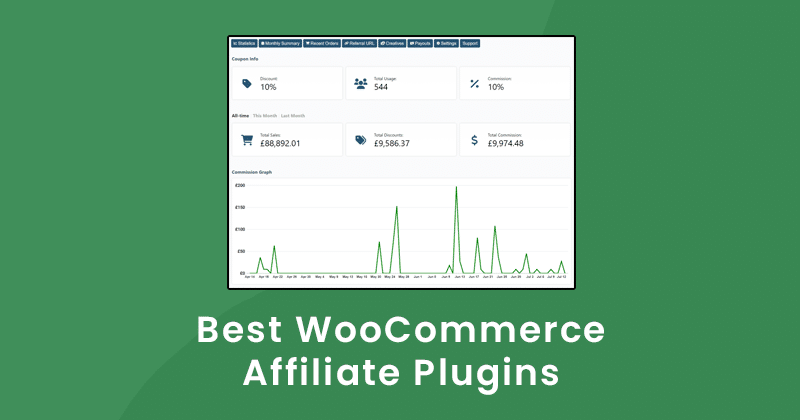Using First-Party WooCommerce Affiliate Cookies While Respecting Your Customers’ Privacy
With the announcement last year that third-party cookies will be banned in the Chrome browser some time in 2024, WooCommerce affiliates will need to adapt.
Plenty of today’s systems still identify and track their affiliate program target using these third party cookies. Some time next year, those systems will be hopelessly broken.
This article talks about how first party cookies can be used to future proof your business, and how to effectively manage leads on your WooCommerce affiliate program.

Old VS New – Affiliate Program Target Tracking
The old way of doing affiliate target tracking was quite invasive: Third party cookies.
Third party cookies are saved to a user’s web browser when a program or service (run by someone other than the website owner) wants to save personalized information.
The problem with third party cookies is that they aren’t necessarily private. Let’s say an app being run by a WooCommerce affiliate promises to track and help convert leads. If that same company has other businesses, there’s nothing to stop them from using that personal information in ways that can annoy or even harm the end user.
For example, let’s say ‘VeryEvilPlugin’ is a WooCommerce affiliate plugin created by some big ad firm. If any users share information with the site using the plugin, it could be populated to every company in the VeryEvilPlugin hierarchy. So their marketing firm could create entire profiles revolving around the user’s habits: Their hobbies, where they shop, their politics, their social media data, their dating and love interests, and a lot of other personal data.
After VeryEvilPlugin’s parent company gathers enough data on the end users, they can sell that information to data brokers for big bucks. Then massive ad conglomerates can buy up third party cookie information from dozens of sources, forming a complete picture of each user’s personal life and buying habits.
The biggest web browser, Chrome, has not yet followed Brave, Firefox, Tor, or Safari’s example and blocked third party cookies. Instead, they’ll start trials of a new tracking system (Google Topics) in 2024, with hopes to migrate everyone off of third party cookies by the end of that year.
The new way to do WooCommerce affiliate program target tracking is far more localized, and protects the user’s privacy much more effectively: First party cookies.
This means a user’s private information stays between you and the target website, and isn’t sent to some multinational advertising agency. The same domain that makes the affiliate offer to the user is responsible for placing and managing the cookie’s contents. Cookie management may include storing analytics data, remembering site preferences like language settings, and in this case remembering WooCommerce affiliate related data.
The user’s privacy is protected, as third party advertisers have no access to (or control over) any personal data that they share with the website owner. There’s a direct chain of trust and responsibility between the end user and the website operator.
What Happens When Chrome Eliminates Third Party Cookies?
In short? Many WooCommerce affiliates using third-party cookies are either going to lose a lot of monitoring and control capabilities, or they’ll simply go out of business.
It’s highly unlikely that the majority of the systems that use third party cookies will be able to transition to a new system. With no browsers able to support the intrusive level of interaction that they require, they’ll simply shut their doors to new customers and drastically reduce support to their current customer base.
Some affiliate software developers might be in the process of moving away from their third party networks and taking on all of the responsibility in house. Others might be planning to integrate with the new Google Topics system.

Making Use Of First Party WooCommerce Affiliate Cookies
The easiest way to adopt this level of trust with your users is to find a reliable WooCommerce affiliate plugin. For many website owners, that means a WordPress plugin.
One of the easiest ways to incorporate first party WooCommerce affiliate cookies is to install Coupon Affiliates.
Coupon Affiliates is a WordPress plugin that will manage the entire affiliate acquisition and tracking process for WooCommerce. The installation instructions are right here.
By taking the power out of the hands of systems that use third party cookies, you can help keep the information of your users out of the hands of third party ad agencies. That means your affiliates and sub affiliates receive less spam and are not subjected to invasive examination by data brokers and their customers.
Coupon Affiliates is a unique plugin when it comes to cookies, since it is designed around primarily using “coupon codes” for tracking referrals. That means it’s possible to have no additional cookies created by the plugin whatsoever. This is also a much more accurate way to track referrals from your affiliates, since the purchase is guaranteed to be linked to the affiliate if the coupon was applied, and can’t be blocked by browsers or privacy apps.
Coupon Affiliates does however use first party cookies to track referral URLs. The primary use case for these is to automatically apply the Coupon Code to the customers cart.
Whenever an affiliate referral URL is clicked, some first-party cookies are created.
For example, ‘wcusage_referral’ and ‘wcusage_referral_code’ cookies make sure that the customer is property credited to the referring affiliate when a referral URL is clicked, and will also automatically apply the affiliates coupon once the customer adds items to their cart. This is because they survive across sessions and tabs (unless a user actively purges them), so your affiliates get credited even if it takes a couple of visits for the customer to make a transaction.
You can use the Coupon Affiliate plugin as a manager for WooCommerce affiliate programs, influencer programs, and referral programs. Because it uses first party cookies, people are far more willing to trust your affiliate system, knowing that their privacy is being looked after.
If there are additional features you’d like to see, the roadmap section allows you to vote on which enhancements are most important for future versions.
If installing such things goes outside of your comfort level, you can look into getting a WordPress management service that can help you to install and configure your plugins.
The Future Of Affiliate Program Target Tracking
We may be moving into more complex relationships with affiliate partners in the future. Depending on the new mediums that emerge over the next ten years, browser fingerprinting or biometrics might slide into the same shady territory that third party cookies once inhabited.
But some version of first party cookies will remain, perhaps in its current form, or perhaps by voluntarily sharing data from augmented reality usage (if AR and VR really take off).
So try to make decisions that limit the spread of your personal data, whenever possible. First party cookies do just that.
If you have any questions, feel free to contact us and we’ll do our best to answer them!
Bill Ricardi is a former Silicon Valley sysadmin, and uTest’s 2010 Performance Tester of the Year. He was test manager for Deloitte before becoming a full time author in 2017, and is also a regular contributor to the Coupon Affiliates blog.




Leave a Reply